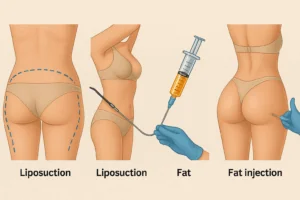Respiratory diseases have become an increasing health problem. In particular, asthma and Chronic Obstructive Pulmonary Disease (COPD) are two major respiratory diseases that affect millions of people and seriously reduce their quality of life. In this article, as a pulmonologist, I will share detailed information and recommendations about asthma and COPD.
Asthma Moments When Breathing Becomes Difficult
Asthma is a disease caused by chronic inflammation of the airways. People with asthma sometimes have difficulty breathing and this can significantly affect their daily lives.
Symptoms of Asthma
The most common symptoms of asthma are:
- Shortness of breath
- Feeling of tightness in the chest
- Cough (especially at night)
- Wheezing
These symptoms can be exacerbated during an asthma attack. Asthma attacks can be caused by various triggers and can sometimes be life-threatening.
Causes and Triggers of Asthma
The exact cause of asthma is unknown, but genetic and environmental factors are thought to play a role. Asthma triggers can vary from person to person, but the most common triggers are the following:
- Allergens (pollen, dust mites, mold, animal hair)
- Air pollution
- Cigarette smoke
- Cold weather
- Physical activity
- Stress and strong emotions
- Some medicines (aspirin, beta-blockers)
- Viral infections
Asthma Treatment
Asthma treatment aims to control the disease and enable patients to lead a normal life. Treatment usually consists of two main components:
- Long-term control medicines: These medicines are used regularly to reduce inflammation and prevent asthma symptoms. For example, inhaled corticosteroids and leukotriene modifiers.
- Medicines that provide quick relief: These medicines are used to make it easier to breathe quickly during an asthma attack. For example, short-acting beta-agonists.
In addition to medicines, it is also important for patients to make lifestyle changes to treat asthma. These changes can include:
- Quit smoking or stay away from cigarette smoke
- Regular exercise
- Identify and avoid allergens and other triggers
- Learning and practicing stress management techniques
COPD: A Chronic Respiratory Disease
Chronic Obstructive Pulmonary Disease (COPD) is a progressive disease that causes permanent damage to the airways and lungs. COPD is usually caused by long-term smoking and tends to worsen over time.
Symptoms of COPD
The main symptoms of COPD are:
- Chronic cough
- Sputum production
- Shortness of breath (especially during physical activity)
- Wheezing
- Feeling of tightness in the chest
As COPD progresses, these symptoms become more severe and can significantly limit the patient's daily activities.
Causes and Risk Factors of COPD
The most common cause of COPD is smoking. However, other factors can also contribute to the development of COPD:
- Prolonged exposure:
- Air pollution
- Chemical fumes
- Dust
- Genetic factors (such as Alpha-1 antitrypsin deficiency)
- Frequent recurrent lower respiratory tract infections
- Age (more common in people over 40)
COPD Treatment
While there is no definitive cure for COPD, there are various treatment modalities available to control symptoms and improve quality of life:
- İlaç tedavisi:
- Bronkodilatörler (hava yollarını genişleten ilaçlar)
- İnhale kortikosteroidler (iltihabı azaltan ilaçlar)
- Fosfodiesteraz-4 inhibitörleri
- Antibiyotikler (akut alevlenmeler için)
- Oxygen therapy: Used to increase blood oxygen levels in patients with advanced COPD.
- Pulmonary rehabilitation: A comprehensive program that includes exercise, nutritional counseling and education.
- Surgical interventions: In very advanced cases, lung volume reduction surgery or lung transplantation may be considered.
It is also very important for patients to make lifestyle changes in the treatment of COPD:
- Quitting smoking (the most effective way to slow the progression of COPD)
- Regular exercise
- Healthy eating
- Vaccination (flu and pneumococcal vaccines)
Differences Between Asthma and COPD
Although asthma and COPD have similar symptoms, they are different diseases. Here are some key differences:
- Age of onset: Asthma usually starts in childhood or adolescence, whereas COPD occurs mostly in adults over 40.
- Triggers Asthma symptoms usually occur in response to specific triggers and are temporary. COPD symptoms are usually persistent and worsen over time.
- Reversibility In asthma, airway narrowing is usually reversible and can be corrected with treatment. In COPD, airway narrowing is permanent and cannot be fully corrected.
- Main cause: While the exact cause of asthma is unknown, the main cause of COPD is usually long-term smoking.
- Response to treatment: Asthma patients usually respond well to treatment and can lead a normal life. In COPD, treatment is aimed at relieving symptoms and slowing the progression of the disease.
Recommendations for Asthma and COPD Patients
Here are some recommendations for both diseases to improve patients' quality of life and keep symptoms under control:
- Take your medicines regularly: Taking your medicines as prescribed by your doctor is the most important way to keep your disease under control.
- Avoid triggers: Identify triggers for asthma and COPD and avoid them as much as possible.
- Go for regular check-ups: Visit your doctor regularly to monitor the course of your disease and adjust your treatment if necessary.
- Adopt a healthy lifestyle: Exercise regularly, eat a healthy diet and get enough sleep.
- Stop smoking: If you smoke, make sure you quit. Smoking is the biggest risk factor for both asthma and COPD.
- Stress management: Stress can trigger symptoms of both diseases. Learn and practice stress-reducing techniques such as meditation and yoga.
- Get your vaccinations: Flu and pneumococcal vaccines in particular can help prevent respiratory infections.
- Make an emergency plan: Knowing what to do in an emergency is very important, especially for people with asthma. Make an emergency plan with your doctor.
- Join support groups: Sharing experiences and learning from people in a similar situation can help you cope with your illness.
- Organize your home and work environment: Clean, humidify and ventilate your home and workplace regularly to reduce allergens and irritants.
Conclusion
Asthma and COPD are serious respiratory diseases that can be controlled with the right treatment and lifestyle changes. Early diagnosis and appropriate treatment of these diseases can significantly improve the quality of life of patients.
If you are experiencing symptoms such as shortness of breath and chronic cough, I recommend that you consult a pulmonologist immediately. Remember, early diagnosis and regular follow-up are the most important steps in the fight against these diseases.
We wish you healthy breaths!




















